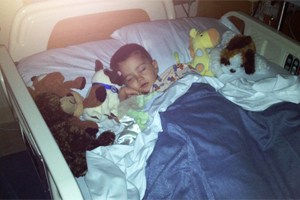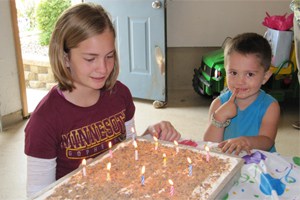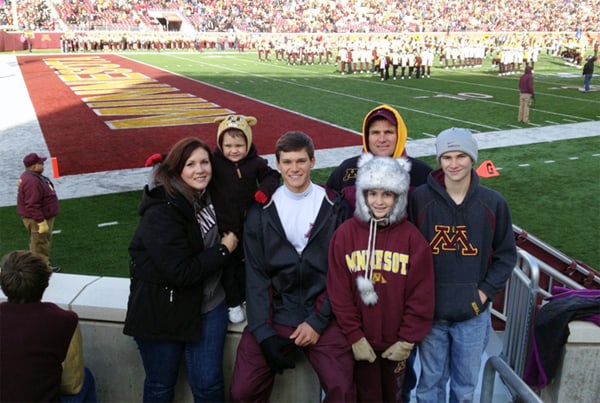JANUARY 2013
Carrie Klumb
Senior Epidemiologist, Minnesota Department of Health

Leo in his hospital bed
Leo’s illness began on Wednesday, September 19th with a 103 degree fever and then diarrhea. His fever got better but his diarrhea continued for several days. We thought it was just a “stomach bug” but then we noticed streaks of bloody mucus in his stool, he began crying, and was noticeably in pain. I took him to the bathroom and I had to hold him up on the toilet where he filled the toilet with bright red blood. That’s when I knew that we needed to take him to the hospital.
Leo was seen in the emergency department right away, on Friday, September 21st where they gave him IV fluids and pain medication. He was kept overnight and then transferred to the pediatrics unit the next morning. Doctors were concerned that he had an E. coli infection so they took a stool sample, which came back positive for E. coli O157:H7. The medical team told us that Leo may develop hemolytic uremic syndrome (HUS), which can happen when people have E. coli O157:H7 infections. HUS leads to kidney failure and destroys red blood cells. Unfortunately, Leo ended up developing HUS and his kidneys stopped working properly. He became very pale, bruised easily, and got really puffy like a marshmallow. Leo ended up needing two blood transfusions and was in the hospital for 9 days. We feel very blessed to have St. Mary’s and Mayo so close to us and are grateful to the medical team that cared for Leo.
Even after we were able to bring Leo home he was still very ill and continued to have bloody stools and pain for a while. It took a month and a half to clear the E. coli O157:H7 bacteria from his body, during which time he could not attend daycare. Leo will need his blood counts and kidney function tested annually for the rest of his life because his kidneys were damaged from the Shiga toxins produced by E.coli O157:H7.
Each year many children are infected with E.coli O157:H7, and many of these children go on to develop HUS like Leo.

Madison and Leo at Madison's birthday party
We are grateful that Leo was able to come back home with us and is doing well. Watching Leo suffer, seeing him so sick, and not knowing what would happen was horrible. I felt powerless. It was a terrifying experience. When you face the possibility of losing a child, you are forever changed as a parent. On the way home from the hospital, I found myself crying tears of happiness for us but also tears of sadness for the families that would remain at the hospital with their children. As I write this and think back to all those feeling and emotions, I am once again brought to tears as I know this reality all too well as a nurse. Each year many children are infected with E.coli O157:H7, and many of these children go on to develop HUS like Leo.
E.coli O157:H7 is a bacteria spread from fecal matter and is ingested. Simple handwashing, proper cooking of meats, and safe handling and care of animals can prevent it. Educate yourselves on E.coli and other germs that can transfer between animals and people. Understand and learn the importance of good hand washing. We have sinks and soap in our barns, and we wear rubber gloves when milking and doing chores. It is best to assume that your animals have germs that can make you sick and then act accordingly. Be aware of what your children are doing and supervise their hand washing. One thing that all of our kids used to do and many other kids visiting our farm have done is to let the calves suck on your hand. This will NEVER happen again! Knowing what I know now and experiencing what we have with Leo, it’s just too risky. Whether or not your children are farm kids, this information is still important. Petting zoos and fairs all pose the same risks. If your children are attending these events, supervise them. Watch that they don’t put their hands in their mouths and make sure to wash their hands and fingernails well.

